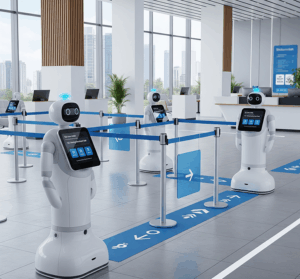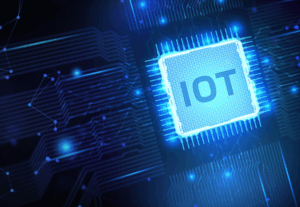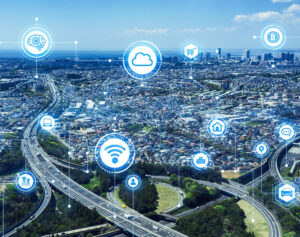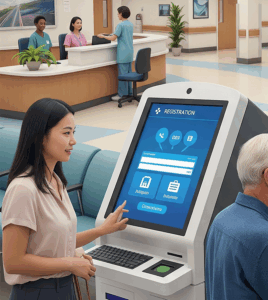
News & Updates

Southeast Asian Smart Cities: Technology Integration Trends for 2025
In 2025, Southeast Asia is accelerating smart city development, with technology integration at the core of urban transformation. From Singapore to Jakarta, governments and businesses are deploying AI, IoT, and cloud-based infrastructure to tackle urban challenges. The push for smarter cities focuses on mobility, sustainability, and efficient public services.
This blog explores key technology trends reshaping Southeast Asian smart cities, highlighting how AI, automation, and interoperable platforms are creating safer, more responsive urban environments. Public and private leaders are leveraging enterprise IT systems, connected infrastructure, and real-time data to boost operational efficiency and citizen experience.
AI-Driven Urban Operations and Predictive Analytics
Southeast Asian cities are adopting AI and predictive analytics to optimise urban systems. By analysing real-time and historical data, cities can anticipate demand, streamline workflows, and manage resources more efficiently. From traffic management to public health, AI is enabling faster, more adaptive responses to shifting urban dynamics.
Smarter Traffic Management
Cities like Singapore and Kuala Lumpur are using AI-powered traffic systems to cut congestion. These systems analyze live and historical traffic data to adjust signal timings and recommend reroutes, reducing peak-hour delays by up to 30%. Intelligent traffic management is now vital to improving mobility and urban productivity.
Proactive Healthcare Resource Planning
Hospitals across the region are using predictive analytics to forecast patient volumes and allocate resources in advance. This reduces wait times and ensures readiness during emergencies. By analysing trends in appointments and patient flow, healthcare providers can deliver more efficient, proactive care.
Seamless IoT Integration for Connected Infrastructure
IoT is transforming infrastructure management in Southeast Asian smart cities by connecting physical assets with digital systems for real-time monitoring and response. Cities are deploying sensor networks across utilities, transport hubs, and public spaces to support smarter energy use, predictive maintenance, and enhanced public safety.
By linking once-disparate systems into a cohesive digital ecosystem, IoT improves operational efficiency and the citizen experience. Continuous data collection from buildings, roads, and amenities enables dynamic resource allocation and sustainability—positioning Southeast Asia as a leader in resilient, adaptive urban infrastructure.
Unified Energy and Utilities Management
Smart sensors are optimising energy and water usage by monitoring consumption, detecting leaks, and tracking air quality in real time. Automated systems respond instantly, helping cities cut utility costs by 15–20% and meet environmental targets.
IoT-Enabled Security and Surveillance
Connected surveillance and access control systems provide real-time situational awareness, especially in high-security zones. AI-driven analytics detect anomalies and enable swift emergency response, enhancing both public safety and regulatory compliance.
Smart Facility Management in Public Spaces
IoT platforms automate maintenance in public spaces—monitoring infrastructure health, scheduling preventive repairs, and reducing downtime. This ensures clean, safe, and reliable public amenities while lowering long-term operational costs.
Cloud-First Platforms for Scalable Public Services
Cloud adoption is transforming public service delivery in Southeast Asian smart cities, offering scalability, agility, and strong data security. Governments and enterprises are embracing cloud-first models to enable rapid deployment of digital services, centralised data management, and support for large user bases across diverse urban environments.
Cloud infrastructure also supports interoperable ecosystems that evolve with regulatory and technological changes. By reducing IT overhead, enhancing security, and ensuring compliance, cloud platforms are now central to building resilient, future-ready urban systems.
Modernising Appointment and Booking Systems
Cloud-based solutions like ATT InfoSoft’s ORBS are streamlining scheduling for healthcare, government, and enterprise services. By automating appointments and resource allocation, ORBS reduces manual tasks and improves user experience. AI-driven optimisation and mobile accessibility ensure responsiveness and seamless integration with existing systems.
Secure, Centralised Data Management
ISO-certified cloud platforms enable agencies to consolidate sensitive data securely, support audits, and ensure regulatory compliance. Centralised environments improve transparency, reporting accuracy, and public trust—essential for expanding digital services.
Automated Self-Service Kiosks and Contactless Solutions
Automation and self-service technologies are redefining interactions across Southeast Asian urban environments, delivering convenience and safety in high-traffic settings. In 2025, cities are deploying modular digital kiosks, contactless payment terminals, and automated service points that streamline everything from registration to transaction processing. These solutions reduce reliance on manual staff interventions, enabling organisations to deliver faster, more accurate services while minimising queues and physical contact. The adoption of self-service systems reflects a broader move towards frictionless urban experiences, supporting both operational efficiency and public health objectives.
By integrating AI and smart automation, self-service kiosks enhance throughput and empower users to manage appointments, payments, and check-ins independently. These technologies are available in adaptable formats from full-height terminals to handheld devices ensuring suitability for a range of environments. As Southeast Asian cities prioritise digital transformation, automated solutions will continue to drive improvements in service quality, resource planning, and citizen engagement across healthcare, finance, and public sector domains.
Enhancing Customer Flow with Queue Management Kiosks
Self-service kiosks powered by AI, such as ATT InfoSoft’s Q’SOFT® Enterprise Queue Management System (EQMS), are streamlining check-ins, ticketing, and queue management in hospitals, banks, and government centres. By automating customer flow, these solutions reduce wait times by up to 40%, allowing staff to focus on higher-value tasks. The integration of robotics extensions like Q’Bot™ further enhances front-of-house efficiency, guiding visitors and providing real-time updates for a seamless, contactless experience. For organisations, this approach delivers tangible gains in operational productivity and customer satisfaction.
Smart Payment Services for Public Facilities
Contactless payment systems such as ATT InfoSoft’s Payment Services Solution are transforming transaction processing in public facilities. Integrated into kiosks and mobile apps, these systems support secure, real-time payments, automated reconciliation, and digital receipts. The shift away from paper-based collections minimises errors and fraud risks, improving audit transparency and accountability. For cities focused on modernising public sector payments, automated digital infrastructure delivers speed, reliability, and enhanced user confidence.
Interoperable Platforms for Data-Driven Decision Making
Integration and interoperability are key to unlocking the full potential of smart city data, enabling Southeast Asian cities to break down silos and make informed decisions across policy, operations, and urban planning.
In 2025, open APIs and modular platform architectures are supporting seamless data sharing between public and private stakeholders, fostering collaboration and system evolution. These capabilities make it possible to combine inputs from diverse sources including IoT networks, queue management systems, and payment platforms creating rich datasets that inform strategic investment and service improvement.
By adopting interoperable solutions, cities can connect new digital systems with legacy infrastructure, facilitating phased upgrades and minimising disruption. This approach reduces total cost of ownership and supports smoother transitions to next- generation services. Advanced analytics platforms aggregate data from multiple domains, providing leaders with actionable insights for infrastructure planning, resource allocation, and policy development. As Southeast Asian cities continue to grow and diversify, data-driven decision making will be crucial for maintaining agility and meeting the evolving needs of urban populations.
Open Data Ecosystems for Urban Insights
Cities across Southeast Asia are developing open data frameworks that allow both public and private stakeholders to access real- time dashboards on mobility, resource use, and environmental health. This transparency drives more effective policymaking and fosters collaboration between government agencies, enterprises, and community groups. By making urban data widely available, cities can encourage innovation, improve accountability, and ensure that decisions are grounded in up-to-date realities.
Modular Integration with Legacy Systems
Interoperable platforms enable government agencies to connect new digital tools with existing infrastructure, supporting phased upgrades and reducing operational disruption. Solutions designed with modular architectures such as those offered by ATT InfoSoft allow for incremental enhancements and lower total costs of ownership. This flexibility is particularly valuable in regulated sectors, where maintaining service continuity and compliance is paramount during digital transformation efforts.
Analytics-Driven Urban Planning
Advanced analytics platforms synthesise data from IoT devices, queue management systems, and payment solutions, providing city leaders with actionable insights for infrastructure investment and service improvement. By leveraging these analytics, urban planners can anticipate growth trends, optimise resource allocation, and respond proactively to changing community needs. The use of data-driven planning supports more resilient, sustainable, and responsive cities, ensuring that technology investments deliver real-world outcomes for citizens.
Southeast Asian cities are setting new benchmarks for urban innovation by integrating AI, IoT, cloud, and automation at scale.These technology trends are delivering measurable improvements in efficiency, sustainability, and citizen experience, positioning the region’s cities as leaders in smart urban transformation. As 2025 progresses, organisations that invest in modular, secure, and interoperable platforms will be best placed to shape responsive and future-ready urban environments. For those looking to accelerate their smart city journey, ATT InfoSoft’s enterprise IT and digital solutions offer a proven foundation for scalable, integrated transformation.
Connect with our team at infosoft-sales@attsystemsgroup.com to explore how we can support your vision for smarter, safer, and more connected cities.
Send us a message
Contact Information
Address:
35 Ubi Crescent, ATT Building, Singapore, 408585
Phone:
Email:
Website:
www.attsystemsgroup.com






